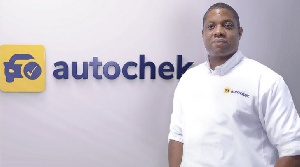Nigerian startup Autochek is aiming at playing a pioneering role in building a digital infrastructure to coordinate the sales, servicing and vehicle records of the auto market in Africa.
“We’re basically focused on technology solutions to build the rails of [Africa’s] automotive sector to run on. We’re focusing on three foundations of the market: transactions and trading, maintenance, and financing,” Autochek CEO Etop Ikpe told TechCrunch.
“It’s different in the type of technology we’re building and that it’s asset-light. I don’t have any inventory. I don’t buy cars. I don’t transact any [physical] cars. I don’t own any inspection locations. I don’t own any dealerships,” he said.
Autochek this month raised a $3.4 million pre-seed round co-led by TLcom Capital and 4DX ventures in a bid to digitize Africa’s automotive sector. It plans to use the fund to expand its operations and geographic scope.
Autocheck has over 20,000 unique vehicles as well as more than 12,000 dealers and private sellers. Currently, it operates only in Nigeria and Ghana. It is planning to start operations in Ivory Coast, Senegal, South Africa, Kenya, Egypt and Algeria.
“Acquisitions are going to be a core part of our expansion strategy,” said Ikpe. Also, the startup is exploring to add associated auto-related services, such as insurance and blue book pricing products.
According to Ikpe, Autochek was born out of a need to disrupt an underutilized and untapped industry. It is a platform for consumers and businesses to buy cars, sell cars, service cars, and finance car sales.
He also revealed that his startup has partnered with 10 banks in Nigeria and two in Ghana so as to create more financing options for both the startup and consumers. “The used car market in Africa is a $45 billion a year market that has only a 5% financing penetration rate…so there’s huge upside for growth,” he said.
The $3.4 seed round by Autochek is arguably the largest round of that stage in Nigeria. Ikpe attributes this to his company’s simultaneous presence in Nigeria and Ghana.
“We’re going after the market in the way we feel is the most effective. And based on the size of the opportunity, I understand that it would require quite a bit of capital. It also allows us to build a great and valuable company over time.”
Africa News of Monday, 30 November 2020
Source: face2faceafrica.com

















